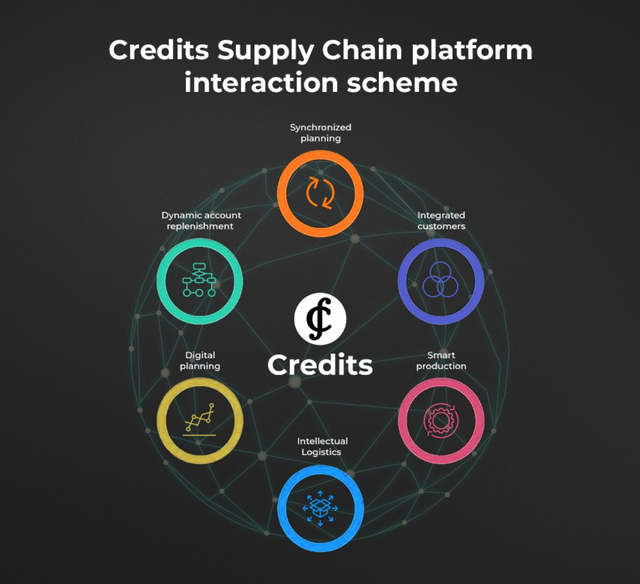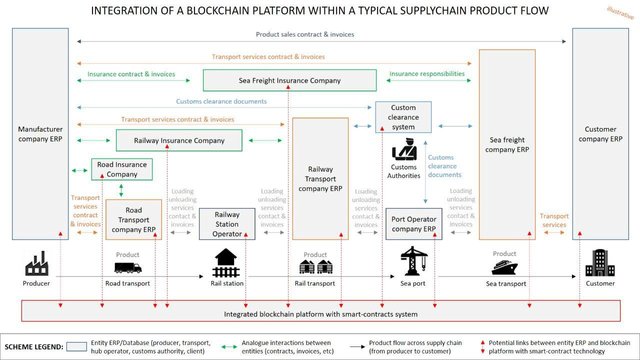How the Credits Blockchain Can Improve the Supply Chain Industry
The Credits platform is, according to their official website:
"an open-source, fully decentralized blockchain software protocol with smart contracts aimed at the creation of high-performance applications".
In terms of transaction processing, it is one of the fastest crypto platforms with a transaction processing speed of 0.1 seconds, and transaction fees going as low as $0.001 in combination with great stability. Improving the speed and the ability to make fast transactions is essential for a project to be considered a competitor to traditional payment methods. The Credits blockchain has achieved incredible results in terms of speed without neglecting the stability and security of user funds. This is why the Credits Blockchain is the perfect platform for the supply chain and shipping industry.
The Disadvantages of the Current Supply Chain Industry
The current supply chain industry has many disadvantages. One important aspect that needs to be mentioned is that the manufacturing and production of goods in today's industries are done mostly offshore, in cheaper areas of the world. That is why the shipping and distribution of these items create difficulties. Let us examine some of the common issues of the supply chain industry.
There isn't enough trust between all parties so the industry relies on expensive intermediaries and middlemen. Payments are sent via banks. This results in extra costs, bank fees and waiting time before the payments are cleared. Bureaucracy and bureaucratic procedures create unnecessary complications because they require stamps, seals of approval, signatures and different codes for different systems.
A lot of documents need to be issued, checked, sent and verified. This results in delays and extra costs. The supply chain industry relies on outdated methods of communication and verification: physical documents, invoices, phone calls, face-to-face meetings, copies of insurance policies, customs clearances, shipping specifications, proof or origins, etc. All these documents are issued and stored by numerous centralized institutions in different places either as a hard copy or in a local computer system or e-mails. All those involved in the supply chain don't have access to these systems.
It is difficult to track the origin of goods and prove their authenticity. It is difficult to prove where the parts came from and if they are genuine or counterfeit. Keeping track of and managing inventory is a problem that many companies have, especially large corporations. Updating the information of all items and entering them into an outdated computer system is time-consuming and once it has finally been done the inventory has changed again.
The Credits Blockchain is the Solution in Simplifying the Outdated Supply Chain
A properly functioning supply chain has the objective to reduce cost but also to deliver cargo to clients in the most effective way possible. A company with a well-optimized supply chain has an advantage over its competitors.
The use of the Credits blockchain can help in overcoming many difficulties. All members of a supply chain will be using the same decentralized application: producers, buyers, transporters and government agencies. The goal is to have only one source of all important information. All the necessary information will be available through this application and it can be accessed by those having the necessary clearance. Once data is entered onto the blockchain by one party it becomes available to all subjects. This prevents the need for multiple data entries in different systems by different people.
The Credits blockchain increases trust between the parties because everyone has access to the same data and can see what is happening at any particular point in time. This transparency and decentralization are sources of trust. All involved parties can see all updates and newly added information and processes. The Credits blockchain serves as a list of recorded information. It is verifiable and unchangeable. Once a general agreement has been reached between all parties the smart contract makes sure that nobody can stop a launched process or transaction. Any data recorded to the blockchain cannot be modified or deleted.
It becomes easier to control and track goods and impossible to falsify documents. The ability to verify and validate goods and keep track of inventory. A blockchain is not under the control of one centralized entity and therefore it does not depend on that authority. The result of this approach: no fraud, no tampering or opacity.
Cost reductions since supporting documents don't need to be issued, sent or verified by different authorities. They are now all part of the same system - the Credits Blockchain. They are not spread around different institutions in their physical form. The use of blockchain technology cuts costs associated with hard copies of documents to zero. Smart contracts are put in place to prevent unnecessary delays and the use of expensive intermediaries. These smart contracts are a guarantee of payment once contract terms have been fulfilled.
An Example of How the Credits Blockchain Can Be Utilized in the Shipment of Cargo
The producer prepares his cargo for shipment. He creates a packaging list in the Credits smart contract which is then sent to the authorized government agencies for approval.
The agencies receive important updates in regards to the inspection of the cargo, insurance, proof of container sealing and other necessary approvals. This is handled by the Credits smart contract and can be inspected by any member of the supply chain.
Once sealed and shipped, the producer can tag the cargo with a GPS sensor which sends a signal in case of tampering with or opening the package before it reaches its destination. The smart contract records data on the Credits Blockchain and all authorized personnel can track the cargo and receive status updates of its journey.
Once the shipment reaches its final destination the smart contract transfers the agreed payment from the seller's wallet and sends it to the producer. The smart contract can be programmed to take into consideration several agreed-upon terms such as delivery delays, refunds, and fines if necessary.
Resources:
https://medium.com/@credits/how-blockchain-could-help-logistics-c3b2ab60be55
For more information about Credits please visit:
Website: https://credits.com/
Announcement thread: https://bitcointalk.org/index.php?topic=3375263
Facebook: https://www.facebook.com/creditscom/
Twitter: https://twitter.com/creditscom
Telegram: https://t.me/creditscom
GitHub: https://github.com/CREDITSCOM



Congratulations @bernardos! You have completed the following achievement on the Steem blockchain and have been rewarded with new badge(s) :
You can view your badges on your Steem Board and compare to others on the Steem Ranking
If you no longer want to receive notifications, reply to this comment with the word
STOPTo support your work, I also upvoted your post!
Vote for @Steemitboard as a witness to get one more award and increased upvotes!